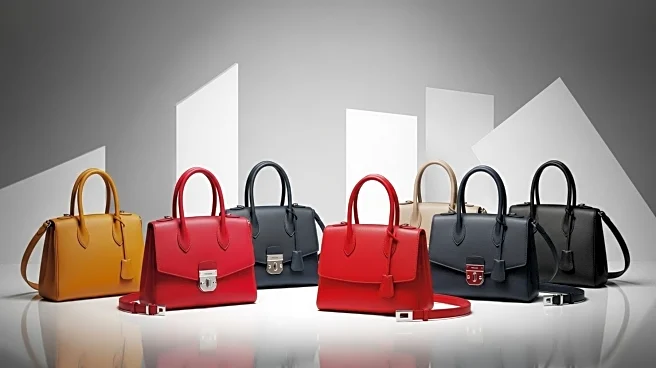What is the story about?
What's Happening?
Luxury brands are facing challenges in appealing to Gen-Z consumers, who are increasingly turning away from traditional luxury goods in favor of more affordable and authentic alternatives. According to a report, luxury sales to Gen-Z shoppers have declined by 4 to 6 percent, compared to a 1 to 3 percent overall drop. This demographic is more inclined to purchase pre-loved luxury items, affordable dupes, or even counterfeits, as they prioritize authenticity, community, and values over scarcity and hype. The shift in consumer behavior is attributed to the rising costs of luxury goods, with items like the Louis Vuitton Speedy bag increasing by over 90 percent since 2019. Gen-Z consumers are also influenced by digital platforms and prefer engaging, authentic marketing strategies over traditional polished campaigns.
Why It's Important?
The shift in Gen-Z consumer behavior poses significant implications for the luxury industry, which has traditionally relied on exclusivity and high price points to drive sales. As Gen-Z is set to surpass Millennials in spending by 2030, luxury brands must adapt to meet the expectations of this digitally native generation. Failure to do so could result in a loss of market share to secondhand markets and brands that align more closely with Gen-Z values. The trend towards authenticity and value-driven purchases highlights a broader cultural shift that could redefine luxury marketing and product development strategies.
What's Next?
Luxury brands are exploring new strategies to engage Gen-Z consumers, such as embracing the secondhand market and creating content that resonates with digital natives. Some brands are focusing on experiential retail and partnerships with young influencers to build community and authenticity. As the industry adapts, there is potential for a resurgence in luxury sales if brands can successfully connect with Gen-Z values and preferences. However, the industry must act swiftly to capture the attention of this influential consumer group before their purchasing habits become permanently entrenched.
Beyond the Headlines
The rise of Gen-Z's preference for authenticity and value over traditional luxury highlights a potential long-term shift in consumer culture. This trend could lead to increased sustainability in fashion, as more consumers opt for secondhand and vintage items. Additionally, the emphasis on community and values may drive brands to adopt more transparent and ethical practices, reshaping the luxury landscape to be more inclusive and socially responsible.


















